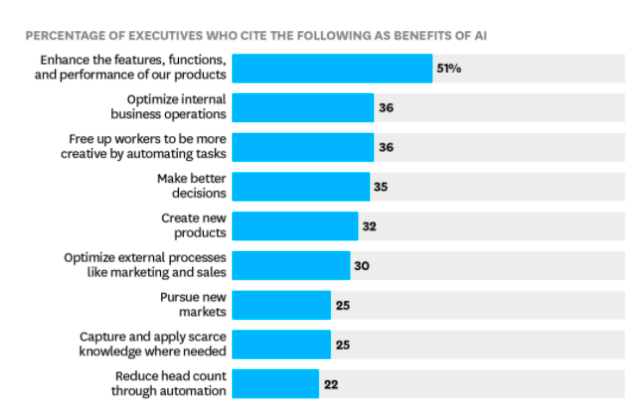How can AI improve your business?

More essentially now than ever, executives are looking for ways to create more optimized and cost-effective business processes, so that they can stay on track with today’s ever-changing market. Artificial Intelligence and AI-driven automation in particular is assisting all kinds of organizations, companies and businesses to achieve their utmost potential.
Broadly speaking, in order for businesses to achieve their objectives, AI can help fulfill three important needs: process automation, engaging with employees and customers, and obtaining and acting on insights from data.
Back-end administration and operations functions are the perfect match for AI contributions in a business, such as:
- Automatically populating records with data that comes from call centers or emails, such as update of customer information with their new phone numbers or problem details for customer service cases;
- Improve client communication and automatically resolve issues;
- Extracting provisions from legal contracts and other documents by using natural language processing;
- Extracting information from several databases to avoid errors in charging for services across billing systems and reduce churn.
Harvard Business Review studied 71 projects to gain insight on AI business process automation. In this research, the authors present that AI process automations are the least expensive and easiest to implement, since they usually bring a high ROI and are adaptive. NASA, for example, launched 4 RPA pilots to handle finance (accounts payable and receivable), human resources, and IT spending – managed together by a single service center. These projects turned out pretty successful; for example 86% of HR applications were completed without human employees helping.
Today’s market has introduced projects where employees and customers are engaging with intelligent agents, machine learning, and processing chatbots. Some of the tasks that could arise in this area are:
- Including images and/or videos to create recommending systems for services and products that increase sales, engagement and personalization;
- Answering HR policies, IT and employee benefits questions on different internal and external sites;
- Artificial Intelligent agents that answer customer’s questions on broad topics, such as: technical support questions – all in an easy-to-understand language;
- Help medical companies to create customized health plans based on a patient’s previous treatments and current health statuses.
Harvard Business Review studied 24 companies which used AI to engage with employees and/or clients. Vanguard (Investment Management Firm) is working on an intelligent agent that helps in answering frequently asked questions. SEBank from Sweden is using ‘Amelia’ to offer help desk support for IT. Amelia is also being limitedly tested on customer response.
In 2017, Deloitte conducted a survey with 250 executives who were familiar with their company’s efforts to involve AI in processes that will engage clients and employees more. The study’s goal was to understand the company’s goals and whether replacing human employees should be one of them. More than half of companies said that improving their products and services was their primary goal, while only 20% claimed they want to reduce their head count through automation.
Thus, both Deloitte and Harvard Business Review suggests that currently, AI inclusion in business processes doesn’t threaten the human workforce.

Source: Deloitte, 2017
From: “Artificial Intelligence for the Real World”
By: Thomas H. Davenport and Rajeev Ronanki
Machine-learning applications support the following tasks through data analysis insights:
- Identify credit fraud and insurance fraud in real time;
- Group business or operational event data based on issue source, to reduce noise;
- Personalize the targeting of ads;
- Predict what people are more likely to buy and
- Identify quality assurance issues in manufacturing processes.
Machine-learning data analysis differs from traditional data analysis in two major ways: the machine-learning analysis is more detailed and data intensive and the analysis is primed with data sets meaning that machine-learning analysis improves with time in terms of using data to make predictions or simply categorizing.
From the Harvard Business Review, it is understood that GE has saved $80 million with the AI data cognition, by negotiating contracts and eliminating redundancies; tasks that previously were managed from the business unit. Similarly, a large bank has identified tens of millions of dollars in services and products that haven’t been supplied by matching data from supplier contracts with their invoices. Another example is Deloitte, which has improved their audit practices by using cognitive data to bring out terms from contracts, enabling an audit to handle a higher number of documents.
Using different studies and reports available, it is clear that the inclusion of AI in businesses is something that should at least be explored, and ideally exploited. With proper planning, management, and development, these cognitive technologies could significantly help in productivity, employee/client satisfaction, and overall business performance.
